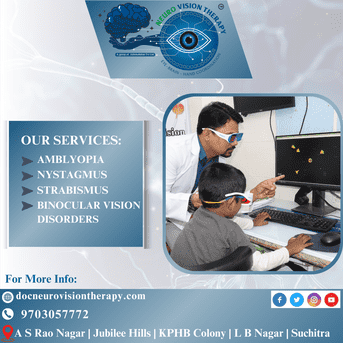


Vision therapy can help individuals with ADHD by improving eye coordination, tracking, and focus, which may reduce symptoms like inattention.
Children experiencing vision difficulties may exhibit signs such as poor attention, limited self-control or hyperactivity. While these symptoms often lead to a diagnosis of ADHD, it’s crucial to consider that vision conditions could be the underlying cause of these behavioral challenges. Unfortunately, traditional vision screenings typically overlook the tests necessary to diagnose vision-related learning issues.
Vision therapy and ADHD can be interconnected in some children, especially those with both attention and visual processing challenges. Children with ADHD may experience difficulties with eye tracking, convergence insufficiency, or visual-motor integration, which can worsen symptoms like inattention, distractibility, and difficulty with tasks such as reading or focusing.
These visual issues can exacerbate symptoms of inattention and distractibility, commonly seen in ADHD, especially during tasks like reading or focusing on nearby objects. Vision therapy involves a series of exercises aimed at improving eye coordination, focus, and eye movement control, which may help children improve attention and reduce frustration in these areas.
Some children with ADHD also have vision problems that can contribute to their symptoms
Vision therapy is sometimes used to treat visual issues in children with ADHD. Here are some potential benefits:
At Ashoka Neuro Vision Therapy, we specialize in diagnosing and treating various neuro vision issues, providing personalized care to help individuals overcome this condition and achieve optimal vision health. Our experienced team of ophthalmologists utilizes advanced diagnostic tools and innovative treatment techniques to address vision issues effectively.
Comprehensive Evaluation: Our experts conduct thorough eye examinations to assess the extent of the problem and its impact on vision. We utilize specialized tests to determine the underlying causes and tailor treatment plans accordingly.
Customized Treatment Plans: Based on the individual’s age, severity and associated vision problems, we design personalized treatment strategies. These may include corrective lenses, eye exercises aimed at realigning the eyes.
Post-operative Care and Rehabilitation: Following interventions, our team provides comprehensive postoperative care and guidance to facilitate optimal recovery and rehabilitation. We work closely with patients to monitor progress and address any concerns throughout the treatment process.
Conclusion
For children with ADHD who also experience visual difficulties, vision therapy can be a helpful tool in improving eye function and reducing visual discomfort, which may, in turn, help with attention and focus. However, it should be viewed as part of a comprehensive approach to managing ADHD and not a replacement for other ADHD treatments. Always consult with professionals who specialize in both ADHD and vision disorders to determine the best course of action.
